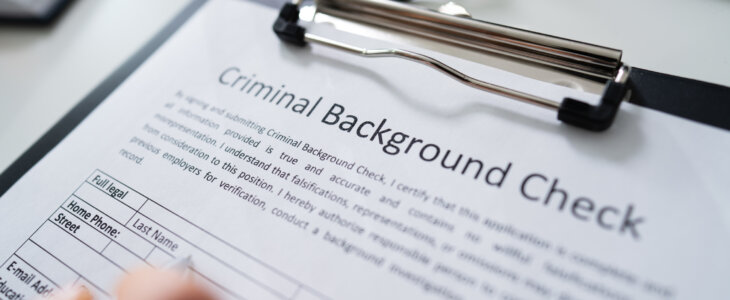Many people mistakenly believe that if their case was dismissed, it will automatically disappear from their record over time. Unfortunately, that’s not the case. In Texas, dismissed charges, arrests, and even certain convictions remain on your criminal record forever—unless you take legal action to remove them.
For job seekers in Houston, having any type of criminal record can be a major barrier to employment. Many employers run background checks, and even a dismissed case can raise red flags that lead to lost job opportunities. Fortunately, Texas law provides options to clear certain criminal records through expunction and nondisclosure, allowing individuals to move forward without the burden of a past mistake.
How a Criminal Record Affects Employment Opportunities
1. Employers Conduct Background Checks
Most employers, even for entry-level jobs, conduct background checks. If an arrest or dismissed case appears on your record, an employer may assume the worst—even if you were never convicted.
2. Some Industries Have Strict Hiring Requirements
Jobs in healthcare, finance, education, government, and law enforcement have particularly strict licensing and hiring standards. A criminal record can prevent individuals from obtaining necessary certifications or passing pre-employment screening.
3. Stigma and Hiring Bias
Even though everyone deserves a second chance, the reality is that many employers are hesitant to hire someone with a criminal record. Many hiring managers see an arrest or dismissed charge as a potential risk, regardless of the circumstances.
4. Limited Career Growth Opportunities
A criminal record can also impact promotions and career advancement. Employees with a record may be passed over for leadership roles, security clearances, or positions requiring professional licensing.
How Expunction Can Help
If you are eligible for an expunction, it is the most powerful way to clear your criminal record. An expunction completely destroys records of an arrest or dismissed case, removing them from public view and background checks.
Who Qualifies for an Expunction?
Under Chapter 55 of the Texas Penal Code, you may be eligible for an expunction if:
- You were arrested but never charged.
- The case was dismissed, and there are no pending charges.
- You were found not guilty at trial.
- You completed a pretrial diversion program.
- You received a pardon after a conviction.
- The statute of limitations has expired.
- Someone else used your identity when they were arrested.
- The District Attorney’s Office agrees to the expunction.
What Are the Benefits of Expunction?
- Your record is completely erased—it will no longer appear on background checks.
- You can legally deny the arrest ever happened (except in a criminal proceeding under oath).
- You won’t have to disclose the arrest on job, housing, or licensing applications.
- Your employment and professional opportunities will improve.
How Long Does Expunction Take?
The process typically takes 3 to 6 months, and agencies have up to one year to fully erase the records.
When Can You Seek an Expunction After a Dismissal?
The waiting period before you can request an expunction depends on the statute of limitations for the charge:
- Most misdemeanors (Class A & B): 2 years from the date of the offense.
- Felonies: Usually 3 years, but some felonies have longer or even no statute of limitations.
Even if your case was dismissed, the state may still prosecute you until the statute of limitations runs out, which is why expunction may not be available immediately.
Can You Get an Expunction Sooner?
Yes. You don’t always have to wait for the statute of limitations to expire. You may be eligible for an immediate expunction if the District Attorney certifies that your arrest records are no longer needed for any investigation or prosecution. In Houston, the Harris County District Attorney sometimes agrees to an expunction before a person would be statutorily eligible.
If your case was dismissed and you want to clear your record as soon as possible, a criminal defense attorney can work with the prosecution to secure this certification, allowing you to petition for an expunction without waiting years.
Can Federal Agencies Still See the Arrest?
Yes, even after an expunction, federal agencies such as the FBI, Department of Homeland Security (DHS), and USCIS may still have access to your arrest records because expunction is a state-level remedy that does not bind federal databases. While most private employers and background checks will no longer see the record, federal agencies may retain it and may require disclosure in certain situations, such as immigration applications, federal security clearances, and some professional licenses. If you are applying for a federal job, immigration benefit, or security-sensitive position, it’s best to consult with an attorney about whether you must disclose an expunged arrest.
Hire an Experienced Expunction Attorney
The process of expunging or sealing a criminal record can be complicated. Hiring an experienced expunction attorney dramatically increases your chances of success.
Attorney Jose Ceja is Board Certified in Criminal Defense by the Texas Board of Legal Specialization, a distinction earned by only a small percentage of attorneys in Texas. He is also recognized as a Texas Super Lawyer. With years of experience successfully handling expunctions and nondisclosures, Ceja Law Firm can help you clear your record and take control of your future.
Call Ceja Law Firm today for a free consultation. A clean record can open doors to better jobs, housing, and new opportunities.











